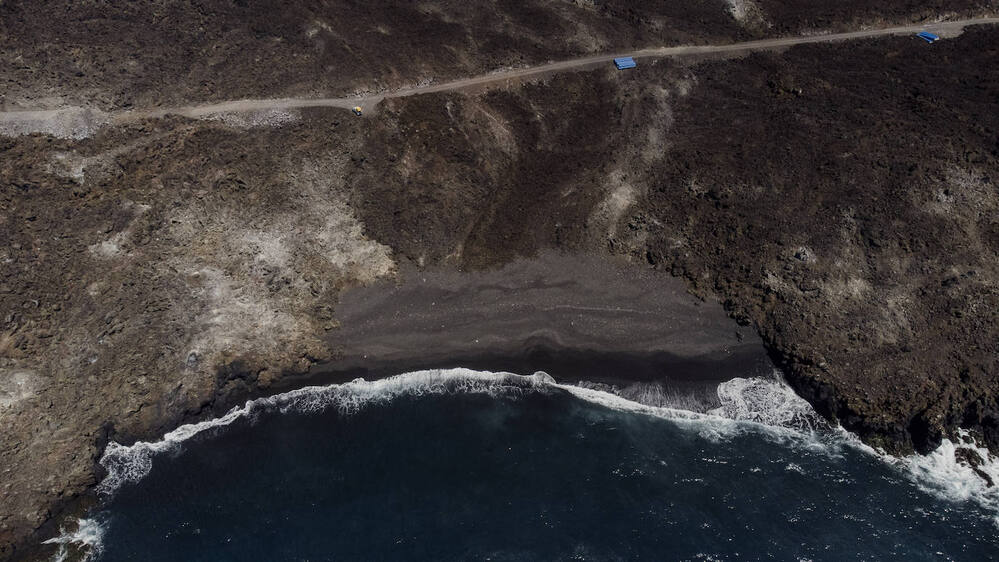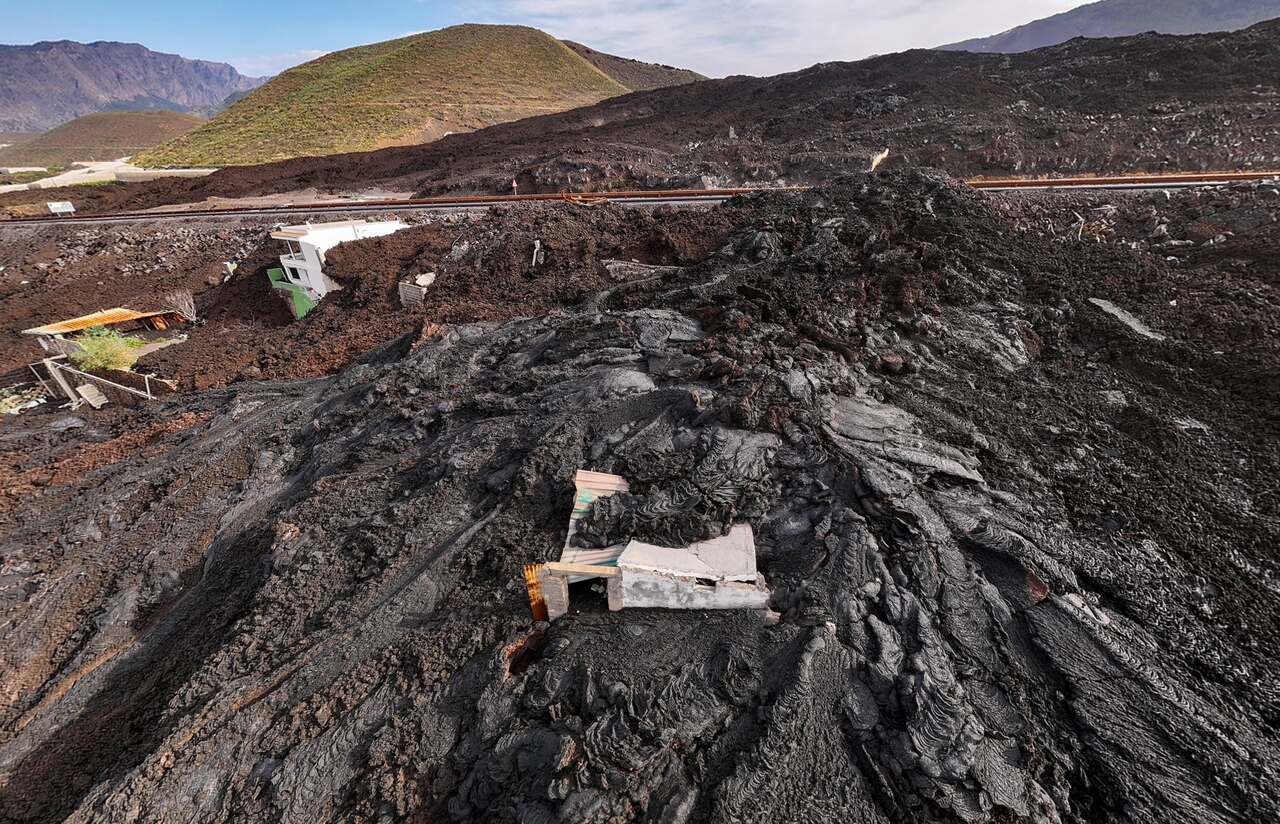03 Apr La Palma Reconstruction – March 2024

La Palma’s Reconstruction: March 2024 Update
Here, we collect and summarise news from across La Palma regarding science in La Palma reconstruction efforts, aid provided to residents and industries, and other relevant news. Sources: La Palma Ahora, Cabildo de La Palma, El Time, ABC España, and El Valle de Aridane.
Lava Bombs 2: The Reconstruction Premieres on La Palma: The documentary Lava Bombs 2: The Reconstruction, co-produced by GeoTenerife and NewLight Studios, has premiered on La Palma at Teatro Chico cinema. The hard-hitting film follows on from the prequel Lava Bombs: Truths Behind the Volcano, and analyses the current situation on the island and the progress of reconstruction of the island, through the voices of those affected. Learn more here.
Science
- Creating value from the volcanic ash: The Cabildo de La Palma is looking into various ways to create value from the 10 million m3 of ash on the island that was expelled by the volcano. Some uses include its inclusion in cement, in road-building materials, and its mixing with soil to create new substrate on reconstructed banana farms using the process of sorriba, adding it to black sand beaches, used in the reconstruction of homes, and creating products such as jewellery as done by the local brand Mararte. However, work is also being done to move the stockpiles of ash to new, adapted spaces, as the current one in Las Manchas causes issues for neighbours on Windy days.
- Studying faults associated with the eruption: A recent study on the two faults responsible for the Tajogaite eruption has been shown to have damaged houses up to 40 years before the 2021 eruption, as well as during and after. The Mazo and Tazacorte faults are moving between 0.5-3 mm/yr, and there are about 12 homes affected by faults showing ongoing movement that are being monitored. In total, 51 homes have been affected by cracks, but the remaining 39 do not continue to move because they were caused by ash loading or discrete earthquakes. The group aims to install a GPS network in the region to better monitor movement across the fault.
- 63 more homes opened in Puerto Naos: From 18th March, 63 more homes, located in the green, orange and red zones of the town, have been opened up for their inhabitants as they have shown continued CO2 concentrations below the 700 ppm threshold, taking the number of homes with authorisation to be inhabited up to 338.
- Proposed measures for La Bombilla and Puerto Naos: The PSOE party has proposed improvements to the management of La Bombilla and Puerto Naos in a letter to the Island President and Island Emergency Plan (PEINPAL). These primarily related to improving security for the area’s residents, and helping professionals who work in these areas. They would like an adequate space for the emergency services and CO2 monitoring personnel in the area, to provide health resources in the area to be able to treat people with gas-related health issues, in the case that any arise, and to provide enough resources for an evacuation of the area should it be needed.
-

El Time (2024) The coast of the southern delta of Tajogaite has lost 50 meters in some points in two years due to erosion. Photography credit: GERARDO OJEDA-COBER
Erosion of the Lava deltas: A study by the University of La Laguna on the changes of the lava deltas post-eruption has found that some parts of the southern delta have retreated by up to 50 m due to erosion since the end of the eruption. The seafloor around the deltas has also changed a lot, with new ecosystems emerging and many plant and fish species being seen in the area. The majority of the erosion happened in the first months after the eruption, although it continues at a slower rate.
- Geothermal prospecting plots to be allocated: The plots on La Palma to carry out geothermal prospecting are to be allocated soon. This is related to 11 geothermal projects costing €48 million combined, awarded by the Institute for Energy Diversification and Saving (IDEA), 6 of which will take place on La Palma.
Reconstruction
- Agrarian recovery decree approved: The decree governing the Agrarian recovery on La Palma, part of the wider economic and social recovery efforts, has been approved. It aims to recover the maximum amount of affected cropland, to give economic protection for those affected during their recovery, and to continue aid from POSEI, the EU’s Agricultural and Rural Development Scheme. It documents how farms can be safely recovered from the lava flows, and how those affected can either receive aid to rebuild or can decide to stop farming and receive the value of their properties pre-eruption paid by the state. This complements the urban and territorial recovery decree approved in December 2023.
- Protected housing decree approved: A new decree has been approved for Protected Housing, to provide housing solutions for those affected by the volcano who cannot take advantage of the re-building options in the affected municipalities, and elsewhere across the island to the general population seeking protected housing. For this, 15 plots of public land across 8 municipalities have so far been acquired.
- CEIP La Laguna School reconstruction: More than 6,500 people have signed a petition urging the rebuilding of CEIP La Laguna School, which was partially destroyed by lava flows in the eruption in October 2021. Since then, little progress has been made, although it was announced as a priority in February 2024, and in 2022 the General Budget of the Canary Islands mentioned its reconstruction. Since then, classes have been taking place in prefabricated classrooms. The Government has put out a tender for the recovery of the school, with a deadline of the 29th of March.
-

El Valle De Aridane (2024) Almost 6,700 signatures urge to rebuild the La Laguna school, after more than two years without moving a stone. Photo credit: I LOVE THE WORLD
Architecture students propose housing solutions: The Los Llanos of Aridane City Council has seen proposals from Master of Architecture Students from the University of Catalonia in collaboration with the Red Cross. During a workshop, similar to one carried out in 2023, students were tasked with coming up with plans for improvements for homes and other public spaces and analysing the temporary settlements set up after the eruption in El Paso and Los Llanos.
- Canarian Coalition (CC) requests an extension of emergency declaration: Canarian Coalition has requested the State to extend the emergency declaration for works on roads and infrastructures affected by the volcano. This declaration allows a streamlined planning process and allows them to skip certain planning elements including environmental assessments. However, some are against this move, with the Deputy of the PSOE party saying this would only be granted so that CC can then blame the State for reconstruction issues.
- Fine for Lava Delta Pipeline expired: The €1.7 million fine imposed on the Insular Water Council in 2023 for the nature of the installation of the Las Hoyas-Remo pipeline has expired, meaning that it may not have to be paid, unless an applicable body, the Coastal Ministry, decides to open a new file extending this fine.
- More road access to farms: In Tazacorte, work is continuing to create tracks across the lava flows to access the land of farms and properties cut off by the eruption. One of the latest works is the recovery of the Los Palacios road. In areas of Tazacorte, where the flows are less than 10m thick, residents have the opportunity to apply for a rustic license to reconstruct their buried farms on top of the flows.
- Options for the Lava deltas: The Tey Group of La Palma has met to analyse potential futures for the lava deltas created by the Tajogaite eruption. They believe that society should decide their uses such as if they should be left unspoilt or developed, for agricultural or touristic gain.
Aid
-

El Time (2024) The Government is working on a solution to apply 60% of personal income tax despite the budget extension. Photo credit: Archive Photography
Extending 60% personal income tax deduction: Work is underway to find a mechanism to further extend the 60% personal income tax deduction for residents of La Palma, implemented to help revive the economy after the eruption. Currently, there has been no confirmation it will be renewed, and because of how it was brought in and the lack of a state budget in 2024 in Spain, there is no mechanism for it to be automatically extended. One way it could be extended is through a decree law introduced by the Government of Spain.
- €1.6 million new aid line: The Government of the Canary Islands has announced a new €1.6 million line of aid, to alleviate personal injuries in homes, for businesses suffering damages, as well as expenses incurred by local businesses/corporations related to the eruption.
- Shock plan for new housing on La Palma: The Shock Plan for the Aridane Valley, within the greater Island Housing Plan, has been announced to help build new homes in the Valley, motivated partly by providing permanent housing solutions to those who lost their homes to the volcano. The Cabildo has received €31 million from the Government of the Canary Islands for this plan, to buy land and construct houses. The was approved in addition to the newly announced public housing decree.
- Permanent housing options for those who lost their homes: The Minister of the Presidency, Public Administrations, Justice and Security, Nieves Lady Barreto, has stated concerning permanent housing options that everyone who lost their homes will receive compensation for the total value of the lost property, although they will be able to opt for a public or subsidised housing solution instead of receiving the payment. The has been controversy over the valuations given to destroyed homes, with many affected saying the valuations are too low.
- Delayed aid for farmers: The Government of the Canary Islands is still yet to pay aid for the loss of income to farmers from the eruption that should have been paid in September 2023. This has been pointed out by the deputy of La Palma, Alicia Vanoostende, who states some farmers will rely on this aid to be able to rebuild their destroyed or damaged farms.
Other updates
- Lawsuit against the management of the volcanic emergency: Tierra Bonita, leading the legal protest against authorities for the management of the eruption, has announced it will appeal to the Constitutional Court for violation of fundamental rights after neither the Court of Los Llanos de Aridane nor a Criminal Chamber of the Provincial Court of Santa Cruz de Tenerife allowed the opening of proceedings to investigate the management of the eruption. Specifically, they want to investigate the timing and lack of evacuations before the eruption began, given the alleged knowledge of the authorities about the likelihood of an eruption and its likely location.
-

El Valle de Aridane (2024) A total of 112 families affected by the eruption received aid vouchers thanks to ‘The Other Stories of the Volcano’. Photo credit: I LOVE THE WORLD
112 receive aid from book profits: Thanks to profits from the book ‘Las Otras Historias del Volcán’ published by Tierra Bonita and ILoveTheWorld, 112 families have received aid vouchers up to a total of €30,000. They were given to the families most in need; those with children, on low income, or with many members unemployed.
- Demand for new study on recovery: Tierra Bonita and Hagamos Pueblo associations have demanded a new official study by the authorities on the current situation for those affected, in terms of aid and other statistics, almost 18 months since the last comprehensive update on the reconstruction, which was produced 6 months after it began.

No Comments